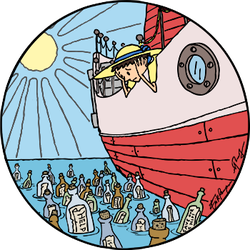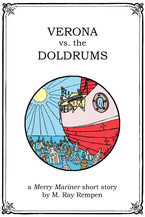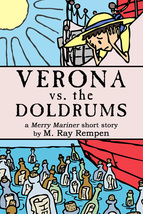Verona vs. the Doldrums has been published - again! Click here to read the first page now, with new pages released Mondays, Wednesdays and Fridays!
Wait . . . what?
If this sounds like some kind of cruel déjà vu, you're not mistaken. Yes, Verona vs. the Doldrums was first published over six months ago, in full, as a PDF, right here on this very site. Yes, now it is gone, as is Waldo and the Spider's Sting.
Why the release rerun? The short answer is - because PDFs are terrible.
Now, I love PDFs. They're stable, widely adaptable, and I was able to design them exactly the way I wanted. One thing that drives me nuts about formatting ebooks for Kindles and iPads (and part of the reason why I haven't released these stories for those platforms yet) is that the platforms are fluid. Not only do they have to work on a variety of screen sizes, they allow readers to adjust font size, which does all kinds of wacky things to the way a book looks. As a proud obsessive perfectionist, particularly when it comes to a reader's experience, I hate that my book might look like amateur hour just because of the platform on which it's displayed.
PDFs solved those problems perfectly. It's a flat, uniform layout, close to the old-fashioned bookish aesthetic, yet still available on nearly any device - in theory.
In practice, nobody reads PDFs. At least, not PDFs of children's books.
It surprised me how few visitors to the site actually went through with downloading the stories. Part of that can no doubt be chalked up to the simple fact that very few people actually go through with internet transactions - be they free or not. But after listening to comments by families reading these stories to their kids, every single one said that the PDF format was clumsy and difficult to deal with. It's hard to figure out how to get it to display on your iPad, it's not really readable on a Kindle, and printing it out page by page is certainly possible, but kind of dumb. PDFs are simply not used for this sort of thing. We use PDFs to read instruction manuals and terms of service, not children's books.
Faced with the terrifying prospect of trying once more to format for e-readers, a good friend instead suggested I simply publish the stories as a blog.
At first I scoffed. A blog? How crude! How distastefully modern! These stories are meant to emulate a bygone age, to bring readers into a nostalgic turn of the century. What could I possibly gain by sharing the same medium as tech tips and cookware reviews?
But the more I heard out my wise friend, the more I began to see the light. Blogs can be formatted such that they don't actually look anything like a blog - much like a PDF. It can be viewed on iPads and even mobile phones without trouble, if you're not one for reading off a computer screen. Since it's just another page on the site, one click and you're there - none of this mucking around with Gumroad or Selz and popup windows and multiple clicks and filling out information - no wonder readers didn't actually get to the download part! I can track analytics simply and efficiently, and best of all, I can serialize the content.
Serialized content is one of the keys to success on the internet, for obvious reasons. If visitors to your website find that there is reason to come back, they will come back. And that's exactly what you want. By posting the stories as a blog, I can hook readers with the first page, end on a small cliffhanger, and make them look forward to updates, ideally by signing up for the email newsletter. I can sprinkle in the illustrations right where I want them, and breaking the story up into short, digestible bits might actually make the experience more like that of reading a book, in that you sort of "turn the page" to find out what happens next. Before you know it, you've clicked through to the very end.
But first, I'm releasing bit by bit, on a schedule. And I'm not doing it alone.
If this sounds like some kind of cruel déjà vu, you're not mistaken. Yes, Verona vs. the Doldrums was first published over six months ago, in full, as a PDF, right here on this very site. Yes, now it is gone, as is Waldo and the Spider's Sting.
Why the release rerun? The short answer is - because PDFs are terrible.
Now, I love PDFs. They're stable, widely adaptable, and I was able to design them exactly the way I wanted. One thing that drives me nuts about formatting ebooks for Kindles and iPads (and part of the reason why I haven't released these stories for those platforms yet) is that the platforms are fluid. Not only do they have to work on a variety of screen sizes, they allow readers to adjust font size, which does all kinds of wacky things to the way a book looks. As a proud obsessive perfectionist, particularly when it comes to a reader's experience, I hate that my book might look like amateur hour just because of the platform on which it's displayed.
PDFs solved those problems perfectly. It's a flat, uniform layout, close to the old-fashioned bookish aesthetic, yet still available on nearly any device - in theory.
In practice, nobody reads PDFs. At least, not PDFs of children's books.
It surprised me how few visitors to the site actually went through with downloading the stories. Part of that can no doubt be chalked up to the simple fact that very few people actually go through with internet transactions - be they free or not. But after listening to comments by families reading these stories to their kids, every single one said that the PDF format was clumsy and difficult to deal with. It's hard to figure out how to get it to display on your iPad, it's not really readable on a Kindle, and printing it out page by page is certainly possible, but kind of dumb. PDFs are simply not used for this sort of thing. We use PDFs to read instruction manuals and terms of service, not children's books.
Faced with the terrifying prospect of trying once more to format for e-readers, a good friend instead suggested I simply publish the stories as a blog.
At first I scoffed. A blog? How crude! How distastefully modern! These stories are meant to emulate a bygone age, to bring readers into a nostalgic turn of the century. What could I possibly gain by sharing the same medium as tech tips and cookware reviews?
But the more I heard out my wise friend, the more I began to see the light. Blogs can be formatted such that they don't actually look anything like a blog - much like a PDF. It can be viewed on iPads and even mobile phones without trouble, if you're not one for reading off a computer screen. Since it's just another page on the site, one click and you're there - none of this mucking around with Gumroad or Selz and popup windows and multiple clicks and filling out information - no wonder readers didn't actually get to the download part! I can track analytics simply and efficiently, and best of all, I can serialize the content.
Serialized content is one of the keys to success on the internet, for obvious reasons. If visitors to your website find that there is reason to come back, they will come back. And that's exactly what you want. By posting the stories as a blog, I can hook readers with the first page, end on a small cliffhanger, and make them look forward to updates, ideally by signing up for the email newsletter. I can sprinkle in the illustrations right where I want them, and breaking the story up into short, digestible bits might actually make the experience more like that of reading a book, in that you sort of "turn the page" to find out what happens next. Before you know it, you've clicked through to the very end.
But first, I'm releasing bit by bit, on a schedule. And I'm not doing it alone.
Another benefit to publishing the stories as serialized online content is that this is already a proven, successful platform for young people. Two years ago Wattpad, a site offering exactly this sort of content, had 20 million users per month. Yes, the vast majority of them are tween girls reading and writing about vampire romance, but even if just 0.5% are younger and/or into fantasy adventure, that's a million potential readers. Count me in.
Attempting to compete with Wattpad are Jukepop and Amazon's own WriteOn, both using the same formula of serialized, democratized written content. They don't have anywhere near the readership that Wattpad has, but Jukepop is curated (they've accepted Verona vs. the Doldrums, woohoo!) and WriteOn is . . . well, currently it's not much, but it's Amazon. If I were a betting man, I'd say they'll probably figure it out.
Anyway, none of them ask for exclusivity and these short stories were always intended to be released for free, so I am losing absolutely nothing by publishing on these platforms.
My plan is to release new pages here on this site Mondays, Wednesdays and Fridays, and to release on Wattpad, Jukepop and WriteOn Tuesdays, Thursdays and Saturdays, with a note at the bottom of each page saying they can come here to read new pages a day early. Hopefully that'll entice a few to stick around. The only downside to these platforms is that they don't really support images - at least, not as many as I like to include in these stories - but again, one more reason to read the stories right here!
Just one last problem. I desperately needed a new cover design.
Attempting to compete with Wattpad are Jukepop and Amazon's own WriteOn, both using the same formula of serialized, democratized written content. They don't have anywhere near the readership that Wattpad has, but Jukepop is curated (they've accepted Verona vs. the Doldrums, woohoo!) and WriteOn is . . . well, currently it's not much, but it's Amazon. If I were a betting man, I'd say they'll probably figure it out.
Anyway, none of them ask for exclusivity and these short stories were always intended to be released for free, so I am losing absolutely nothing by publishing on these platforms.
My plan is to release new pages here on this site Mondays, Wednesdays and Fridays, and to release on Wattpad, Jukepop and WriteOn Tuesdays, Thursdays and Saturdays, with a note at the bottom of each page saying they can come here to read new pages a day early. Hopefully that'll entice a few to stick around. The only downside to these platforms is that they don't really support images - at least, not as many as I like to include in these stories - but again, one more reason to read the stories right here!
Just one last problem. I desperately needed a new cover design.
This might well be the textbook example of an awful cover. It's ugly, unreadable at a small size, and boring. It looks like a prospectus or job application or some other horrifying kind of paperwork, not a whimsical children's tale. A good cover should be legible even when tiny (since that's where the majority of users will see it - on some page listing tens or even hundreds of books at a time), stand out from the crowd to a cover-judging audience, and give a sense of the tone and content of the book.
Inspired by some covers I saw on the aforementioned sites, I did some re-jiggering.
Inspired by some covers I saw on the aforementioned sites, I did some re-jiggering.
I think it's fair to say it's a marked improvement. This cover art ticks all the boxes: readable when small, interesting and colorful, unique. It actually looks like something you might see on a bookshelf. Here's hoping it works to draw in readers.
My plan for these Merry Mariner short stories has always been as a training ground. Through them I will teach myself how to write simple, delightful stories for this age group, get to know the characters and the world, and learn how to gather up and market to an online audience. All of this will lead to the writing and publishing of the first Merry Mariner book, where I will make use of all that I've learned while creating and distributing these short stories. It might get messy, but I always remind myself that this is just the very, very beginning, and I've got big plans for things to come.
Until next time,
M. Ray
My plan for these Merry Mariner short stories has always been as a training ground. Through them I will teach myself how to write simple, delightful stories for this age group, get to know the characters and the world, and learn how to gather up and market to an online audience. All of this will lead to the writing and publishing of the first Merry Mariner book, where I will make use of all that I've learned while creating and distributing these short stories. It might get messy, but I always remind myself that this is just the very, very beginning, and I've got big plans for things to come.
Until next time,
M. Ray





 RSS Feed
RSS Feed
